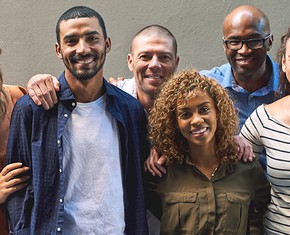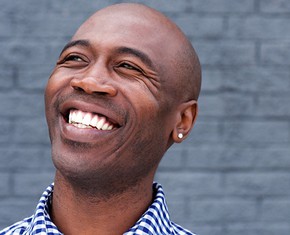The views expressed in our content reflect individual perspectives and do not represent the authoritative views of the Baha'i Faith.
On my neighborhood’s “Nextdoor” site, I saw an open invitation for an event at the local mosque called “Sacred Table.” This effort began when anti-Islamic prejudice flared up and the mosque received a bomb threat. Neighboring churches and the synagogue banded together in support.
RELATED: Beyond Interfaith Dialogue to Interfaith Friendships
Together they designed this Sacred Table gathering, which would move round-robin style to a different place of worship each month. What a wonderful idea, I thought, and so in tune with the Baha’i teachings on religious diversity and unity. In a speech he gave in Paris, Abdu’l-Baha, the son and successor of Baha’u’llah, the prophet and founder of the Baha’i Faith, said:
The diversity in the human family should be the cause of love and harmony, as it is in music where many different notes blend together in the making of a perfect chord. If you meet those of a different race and colour from yourself, do not mistrust them and withdraw yourself into your shell of conventionality, but rather be glad and show them kindness.
So I went to the event. The mosque’s Imam greeted everyone and asked that we sit at a table with people we didn’t know, preferably not of our religion. He explained that on each table was a list of prompts that should inspire us to have a dialogue about something we had in common. The first time we went, I found myself with several Muslims and Christians of different denominations, and all of them happened to be women. The prompt that day was to talk about typical food we used in our religious celebrations and rituals. Though I’m aware that this is commonplace among many religions, there’s really no such thing in the Baha’i Faith, which has no rites or ritual.
I wracked my brain, wondering what to say when it was my turn to speak. Different nationalities and ethnicities within the Baha’i Faith associated certain foods with holy days, but that was really all just personal preference. Looking around the table at the variety of women – dressed in slacks, dresses and full chadors – an idea struck me.
“Baha’is don’t have specific food associated with events,” I said, “and don’t have any rituals. But what I see again and again is that it’s the women who bring the food. Look who’s in the kitchen right now? Could this be an unintended ritual we all share?”
… among the teachings of Baha’u’llah is the equality of women and men. The world of humanity has two wings – one is women and the other men. Not until both wings are equally developed can the bird fly. Should one wing remain weak, flight is impossible. Not until the world of women becomes equal to the world of men in the acquisition of virtues and perfections, can success and prosperity be attained as they ought to be.
A chorus of “Oh, yes!” erupted. Everyone had a story. One offered, “Do men think we were born knowing how to cook or what?” The others murmured in agreement. Another said, “We’ve done it so long, we’re used to it, but it’d be nice if men pitched in.”
“Yes we could be sitting out here discussing big ideas, while they’re in there cooking rice!”
Abdu’l-Baha said “As long as women are prevented from attaining their highest possibilities, so long will men be unable to achieve the greatness which might be theirs.”
Another thought struck me. “We do it to be of service, right? We offer food we’ve prepared with care, hoping people will enjoy it. But what if they don’t? What if no one touches your dish?”
RELATED: How Do We Benefit Spiritually From Service?
This led to a discussion about service and detachment. We agreed that yes, it was disappointing to find that your hours of work have satisfied no one. So we talked about our motives and spiritual development. Interestingly, no one at the table saw herself as being ordained by God to be a cook responsible for preparing dishes for a crowd.
By the end of the afternoon, mutual recognition and laughter had begun forming bonds of friendship.
During the five years since that day, the conversation format has evolved and spread throughout the city where I live, especially among the strong interfaith community. During those years I’ve gotten to know and be friends with women who are Muslim, Jewish, Buddhist, Sikh, Hindu, Zoroastrian and all types of Christians. We talk easily about divine attributes, God, service as well as relationships, children, work, social action and life in general.
Meanwhile, my husband that first day sat at a table where he really didn’t have much to add. But his time came a year later, after we’d become trained facilitators. He went from table to table to find one without a facilitator, and finally found himself at a table that had just newly formed. The Imam caught my eye and we both smiled at the sight of my husband, a middle-aged conservatively dressed white man, sitting amid three women all wearing chadors. I really wondered what they’d talk about. He told me later they’d asked him to say a Baha’i prayer, and after he recited one they exclaimed, “Oh that’s just like one of our prayers!” That broke the ice.
















Comments
Sign in or create an account
Continue with Googleor